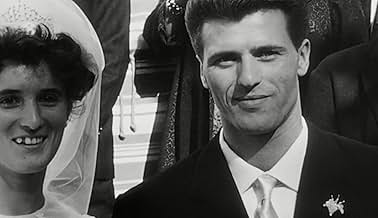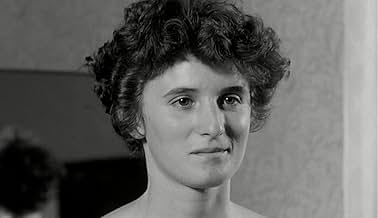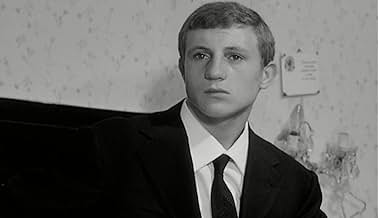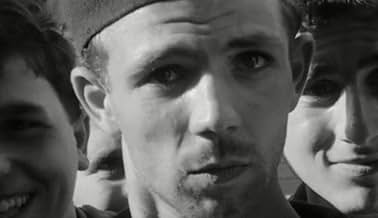VALUTAZIONE IMDb
7,5/10
2807
LA TUA VALUTAZIONE
Microfono alla mano, Pier Paolo Pasolini chiede agli italiani di parlare di sesso. Nonostante la fiorente economia del dopoguerra, gli atteggiamenti degli italiani verso il sesso sono o rigi... Leggi tuttoMicrofono alla mano, Pier Paolo Pasolini chiede agli italiani di parlare di sesso. Nonostante la fiorente economia del dopoguerra, gli atteggiamenti degli italiani verso il sesso sono o rigidamente medievali o confusi e autocensuranti.Microfono alla mano, Pier Paolo Pasolini chiede agli italiani di parlare di sesso. Nonostante la fiorente economia del dopoguerra, gli atteggiamenti degli italiani verso il sesso sono o rigidamente medievali o confusi e autocensuranti.
Lello Bersani
- Narrator
- (voce)
Io Appolloni
- Self - Girl at Lido with Swimming Cap
- (non citato nei titoli originali)
Graziella Chiarcossi
- Graziella the Bride
- (non citato nei titoli originali)
Graziella Granata
- Self - Girl at Lido with Long Hair
- (non citato nei titoli originali)
Pier Paolo Pasolini
- Self - Interviewer
- (non citato nei titoli originali)
Recensioni in evidenza
Pier Paolo Pasolini always has a streak of the documentary filmmaker somewhere in his body of work, where he usually went for expressing his poetic viewpoint on the lower classes (i.e. Mamma Roma) and, later on, the dark fables and tawdry tales of Oedipus Rex and Arabian Nights. If Love Meetings, his only straight documentary feature, isn't completely impressive it may be because in the little moments when he tries for something poetic, oddly enough, like in the numbered transitions, it doesn't really work as well. Those little bits come off as dated 60s stuff. On the contrary though when Pasolini simply takes to the street with a 16mm and a microphone and asks people directly about sex and women's roles and homosexuality and fidelity and freedoms related to all of the above then it gets really interesting. In fact, for a movie relegated to Italian cities and countrysides, with sound-bytes from across the spectrum from college kids to professors (and author Alberto Moravia early on) to farmers in the fields, and done so on the fly and in classic cinema verite style, it doesn't usually feel very old fashioned.
Much of what's discussed and dug up by Pasolini (who reveals himself wonderfully here as a solid journalist, something I would have liked to have seen more of in his career after seeing this) can be relatable for today's youth, if only as a cohesive set of opinions and viewpoints and occasional factoids on standards set between men and women and privacy and liberation and so on. To be sure some of it is stuck in its time and place (practically all of the children asked "Where do babies come from?" say the stork, or something involving God or other). But a lot of it is so absorbing because of the generous flow of ideas- it's a wonderfully edited piece, as sometimes crudely constructed as it is, which is part of the point as a true independent production- and Pasolini's determination to get as much as he can at the heart or whatever at sexual relations and societal norms and what's changed over time in Italy and if there can be any more change in the future. It's probably the most obvious example from the director to screen in a sociology class. 8.5/10
Much of what's discussed and dug up by Pasolini (who reveals himself wonderfully here as a solid journalist, something I would have liked to have seen more of in his career after seeing this) can be relatable for today's youth, if only as a cohesive set of opinions and viewpoints and occasional factoids on standards set between men and women and privacy and liberation and so on. To be sure some of it is stuck in its time and place (practically all of the children asked "Where do babies come from?" say the stork, or something involving God or other). But a lot of it is so absorbing because of the generous flow of ideas- it's a wonderfully edited piece, as sometimes crudely constructed as it is, which is part of the point as a true independent production- and Pasolini's determination to get as much as he can at the heart or whatever at sexual relations and societal norms and what's changed over time in Italy and if there can be any more change in the future. It's probably the most obvious example from the director to screen in a sociology class. 8.5/10
Amid some unsurprising considerations from major italian popular figures of the time, Pasolini publicly asks questions related to sex, ethics, sociology and politics to those bold and naive enough to attempt an answer.
The value of such an endevour - wether it is hundreds or hundreds of thounsands of interviews - is (admittedly by the author) debatable at best except for some - nowadays obvious - sociological observations.
Fortunately Pasolini closes (and saves) the film with a greatly poetic final 3 minutes section that feels like a wrap up of the "results" of his inquiry:
"Do men care about anything but living life? A couple getting married. They don't know anything about their love. Life is merciless the most when it is happy and innocent. The knowledge of what's good or evil lies ahead of this forgetfulness of those busy living. And those knowing don't talk in front of such a grace unwilling to learn. But this silence is criminal."
IMHO the movie is in this aphorism. While never boring the interviews are not really interesting (let alone sociologically relevant) either. The documentary was released rated for 18yo: a side note that again summarizes the point we can make today out of it.
Fortunately Pasolini closes (and saves) the film with a greatly poetic final 3 minutes section that feels like a wrap up of the "results" of his inquiry:
"Do men care about anything but living life? A couple getting married. They don't know anything about their love. Life is merciless the most when it is happy and innocent. The knowledge of what's good or evil lies ahead of this forgetfulness of those busy living. And those knowing don't talk in front of such a grace unwilling to learn. But this silence is criminal."
IMHO the movie is in this aphorism. While never boring the interviews are not really interesting (let alone sociologically relevant) either. The documentary was released rated for 18yo: a side note that again summarizes the point we can make today out of it.
At first sigh, social portrait. Pier Paolo Pasolini across Italy , talking with large categories of people about not very comfortable themes. Their answers, the crowd, the familiar names from Antonella Lualdi and Oriana Falacci to Alberto Moravia, Cesare Musatti or Giuseppe Ungaretti interventions and the answers, genuine, innocent, in few cases hypocritics of people and the discover of powerful tradition defining rules of life, the difference, real profound, betwen South and North of Italy, the silence of middle class , the laws and the essence of a special world. Sure, in my case, the name of director/ interwiever was the basic/ fundamental kick for not ignore this documentary. The prize - the high honesty, the humor, smiles, reactions, laugh, shame, reactions, the manner to explore the one front of him by Pasolini, the crumbs of nostalgia, the memories about pasolinian textes. So, a large slice of life, provocative, in same measure, yesterday and today and, in my case, just fascinating.
In this documentary, Pasolini travels around Italy and interviews random people in public places about their attitudes towards sexuality, marriage, and gender issues. It's fascinating to hear how Italians in the early 1960s felt about these topics, and there are plenty of opinions that seem shocking from a modern perspective. There are people who think that divorce should be illegal (they'd rather have spouses kill each other), parents who find it perfectly normal for 14 year-old boys to lose their virginity with a prostitute, and women who think it's only right that they have less rights and freedoms than men. It's especially interesting to hear the interviewees confess their unabashed disgust towards homosexuals to the secretly gay director.
However, I can't help but wonder if it wouldn't have been more interesting to include some interviews that weren't conducted in public places with groups of people standing around. As it stands, the movie gets a bit repetitive after a while and probably would have been more effective with a shorter running time.
However, I can't help but wonder if it wouldn't have been more interesting to include some interviews that weren't conducted in public places with groups of people standing around. As it stands, the movie gets a bit repetitive after a while and probably would have been more effective with a shorter running time.
Saw this beautifully preserved/restored print, with subtitles, via YouTube. Pasolini, with his reputation for political and every other form of radicalism, seems inhibited here, even in the discussion segments with Alberto Moravia and Cesare Musatti. The man-and-woman (and children, students)-in-the-street-and-on-the-farm interviews seem dated, probably since the interviews were conducted on the cusp of major changes in marital and family laws, policies, sexual attitudes in Italy and elsewhere. While no groundbreaking documentary, it's still a fascinating document of the time and place. A more daring and cinematically imaginative treatment of similar themes is found in, of course, "I am Curious (Yellow)"(1967) and "I am Curious(Blue)"(1968), directed by Vilgot Sjoman (a former UCLA film student). In those days there were things you could do in Sweden, albeit with censorship problems, that were simply impossible in Italy, period.
Lo sapevi?
- ConnessioniEdited into Lo schermo a tre punte (1995)
I più visti
Accedi per valutare e creare un elenco di titoli salvati per ottenere consigli personalizzati
- How long is Love Meetings?Powered by Alexa
Dettagli
Botteghino
- Lordo in tutto il mondo
- 2789 USD
- Tempo di esecuzione1 ora 32 minuti
- Colore
- Mix di suoni
- Proporzioni
- 1.85 : 1
Contribuisci a questa pagina
Suggerisci una modifica o aggiungi i contenuti mancanti

Divario superiore
By what name was Comizi d'amore (1964) officially released in India in English?
Rispondi



























